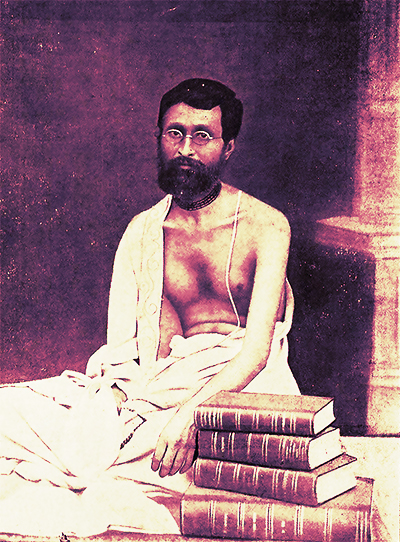śrī śrī guru gaurāṅga jayataḥ!

Year 10, Issue 10
Posted: 11 November 2017
Dedicated to
nitya-līlā praviṣṭa oṁ viṣṇupāda
Śrī Śrīmad Bhakti Prajñāna Keśava Gosvāmī Mahārāja
Inspired by and under the guidance of
nitya-līlā praviṣṭa oṁ viṣṇupāda
Śrī Śrīmad Bhaktivedānta Nārāyaṇa Gosvāmī Mahārāja
Lust for Kṛṣṇa is fostered by the highest angels

Professor Suthers: Your Holiness seems to have taken a biased view in saying, “If the good moral precepts of Saint Christ were increased thousands of billions of times, thereby attaining perfection, they would wait to receive orders for serving the morality of the amorous love of the devotees of Kṛṣṇa”.
Prabhupāda: Certainly not. We claim to be greater and better Christians. Our judgment is not restricted only to secular morality. The morality of the Object of spiritual love transcends even supra-natural morality, which itself surpasses secular morality. If Christian morality is perfected thereby, then it may be said to receive proper nourishment.
To a pure soul that remains situated on the transcendentally moral plane of love, secular moralities appear to be smaller, like pygmies standing next to tall men. But there is found neither a feeling of apathy nor one of attachment towards these secular moralities. Rather, all such moralities are like maids, standing behind spiritual moralities and waiting to become elevated, having received permission to serve the Lord of transcendental love. The character of a culturist of spiritual love is never devoid of morality. One hostile to morality or fallen from it can never be a spiritual man.
In the blaze of teaching of Śrī Caitanyadeva’s ideal, it has been propagated that licentiousness is not devotion. Palpable evidence of this is found when we reflect on the character of Śrī Caitanyadeva or those who are followers at His heel. Those in the realm of secular morality, who are concerned with worldly enjoyment as well as the renunciation of the same, will be unable to grasp with their meagre intelligence how much the amorous sports of Kṛṣṇa are fostered by the climax of morality and how superlatively adored they are by all the morality of the universe. The amorous sports of Kṛṣṇa are found at the core of the culture of the noble clan of such high personages as the devotees of Śrī Caitanyadeva like Śrī Rūpa, Śrī Sanātana, Śrī Raghunātha Dāsa, Śrī Raghunātha Bhaṭṭa, Śrī Jīva, and Śrī Gopāla Bhaṭṭa, who each embodied the strictest continence of character.
Professor Suthers: How can your Holiness’ statements be reconciled with descriptions of Kṛṣṇa’s amorous sports?
Prabhupāda: Kṛṣṇa’s amorous sports are not temporal like the lustful sports of dramatic heroes and heroines such as Romeo-Juliet or ideal spouses. Lust, as prevalent in this world, is only a mental passion. But the lust of Kṛṣṇa’s transcendental realm has form. In this world, lust is always goaded by the enemy (the six passions), whereas in Kṛṣṇa’s transcendental realm, the loveliness of Kṛṣṇa’s spiritual body ever drives transcendent lust for Him, which takes form as love or the desire to gratify His senses. While the conductor of worldly lust is the enemy (the six passions), the conductor of transcendental love is Kṛṣṇa. It is the amorous sports of Kṛṣṇa that have the quality of appropriateness; there is no such consistency in the lust born of the material body and mind of a jīva (living entity). Kṛṣṇa’s amorous sports are not to be called indecency because Kṛṣṇa alone is the exclusive and unrivalled enjoyer of all, the embodiment of real Truth, and the absolute spiritual autocrat.
Professor Suthers: I cannot fully appreciate this. Please let me understand it a little more clearly.
Prabhupāda: Picture two, or four or so on, right-angles complimenting each other. When there is an acute, right or obtuse angle, there is contraction, and the character of a corner is present. But the combination of two right angles, in compliment, becomes the straight angle. Even though it is called an angle, there is no contraction, no corner, no want of straightness as there is in the case of angles in general. Such is the case with Kṛṣṇa, the absolute autocrat. There is no want or contractedness, nor any despicable character or indecency in the perfect entity, Kṛṣṇa. Or like the circle of 360 degrees, Kṛṣṇa is perfect and complete, but members of the two communities of enjoyers and renouncers, who champion morality or immorality, may, due to the meagreness of their intellect, wrongly regard the transcendent lust surrounding Kṛṣṇa – the result of His Absolute power, which is His right alone – as vulgar like that of common men and other creatures.
Adapted from The Gaudiya Volume 5, Number 11
by the Rays of The Harmonist team





